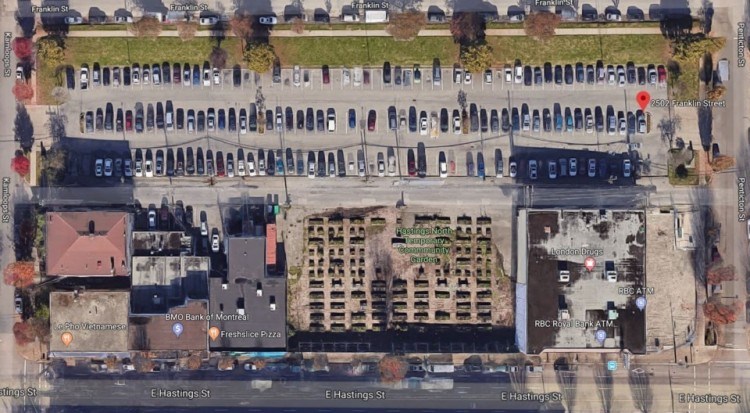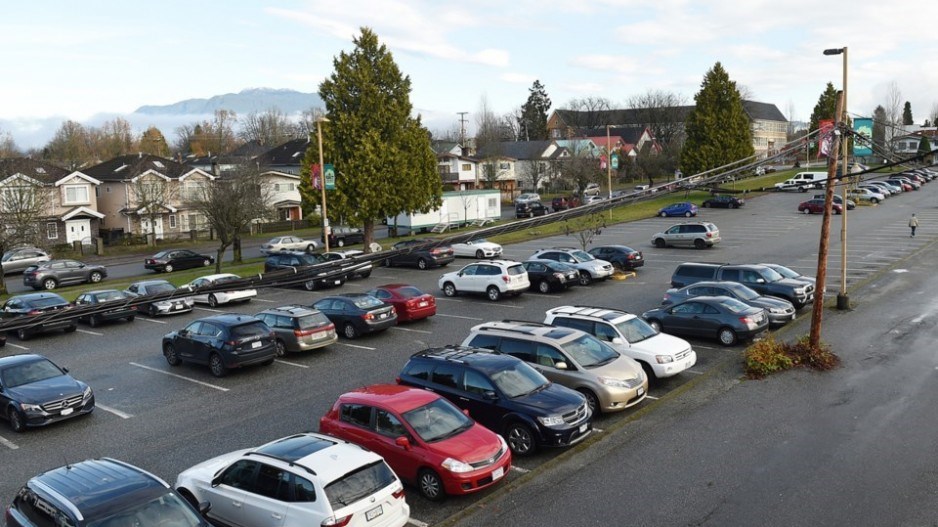A parking lot in East Vancouver that is supposed to be redeveloped as affordable housing for women is the subject of a legal fight that will go to trial and pit a property owner in the neighbourhood against the City of Vancouver.
City lawyers argue the court action could lead to increased costs for the project at 2502 Franklin St. or loss of funding partners, with a judge’s comments in an Aug. 12 B.C. Supreme Court ruling recognizing the city’s concern that “the uncertainty has already affected confidence in the project.”
At issue is whether the 180-space parking lot behind the London Drugs on East Hastings Street, which was assessed this year at $17.3 million, is being held in trust by the city on behalf of property owners in the Hastings-Sunrise neighbourhood.
The city is on title as owner of the lot located between Penticton and Kamloops streets, but Aura Ventures Corp. — which owns properties on East Hastings — has argued the property has been held in trust for owners since the 1960s.
The city, which denies being a trustee of the parking lot, says there is no merit to any of Aura’s claims and that all amounts assessed against and collected from property owners over the years were collected as taxes as authorized by law.
Court documents indicate that in 1964 some of the then-registered owners in the neighbourhood petitioned the city to carry out the development of the parking lot as a local improvement.
The petitioners requested the city acquire 15 lots, demolish any existing structures or improvements and build the parking lot. The city did so and then imposed a “special assessment” against the affected property owners to pay for acquisition and construction.
That “special assessment” was in place from 1965 to 1990 and collected as a tax.
The city also enacted a bylaw annually since 1966 to collect from property owners the costs for maintenance, repair, insurance and electricity of the parking lot, as well as forgone property taxes.
Aura submits that the “beneficial ownership” of the parking lot runs with the land, and the current owners now hold the “beneficial interest,” according to details of the case published in Madam Justice Grace Choi’s Aug. 12 ruling.
Choi ruled that the matter will proceed to a summary trial, despite Aura’s request that its application for a class action suit totaling 60 owners be certified before a trial proceeds.
A summary trial means the trial will be based on written evidence rather than hearing evidence of witnesses in court. Typically, the judge will hear a summary trial sooner than a regular trial.
“The proposed summary trial is on a discrete issue that is largely, if not entirely, a question of law,” Choi said in her written decision.
“A key factor is that it will significantly narrow the issues for trial, if not dispose of them completely, and it will promote settlement. Hearing the summary trial before certification in this case would promote the fair and efficient determination of the matter.”

A Google satellite view of the parking lot on Franklin Street, located between Kamloops and Penticton streets
In June 2019, Mayor Kennedy Stewart announced the city was providing the land in question for a housing project that would prioritize Indigenous women and their families. A childcare centre and service hub that includes a healing and wellness space was also proposed for the building.
At the time, the federal government promised $150,000 to kick-start planning for the project, which the mayor said would be developed and run by women, although a builder nor non-profit management agency was disclosed during the announcement.
The development was marketed as a legacy project of the 2019 Women Deliver conference in Vancouver, which at the time was the world’s biggest event on gender equality and the health, rights and wellbeing of girls and women.
Reconciliation with Indigenous peoples is one of the project’s broader goals.
The city has promised a parking analysis will be conducted to ensure the development provides replacement parking to serve the needs of the neighbourhood and businesses, according to information posted on the city’s website.
Glacier Media contacted the city's communications department Monday for more details about the affordable housing project's status, but had not heard back before this story was posted.
As for the legal fight delaying the project, Aura argued the city’s “alleged urgencies are its own doing,” saying it could have chosen a different location for the project or investigated whether the parking lot was subject to any encumbrances and settled any potential claims before choosing a site.
“The city did not bring evidence showing that its funding partners are withdrawing, or that the cost of the project is increasing as a result of this litigation,” according to a summation of Aura’s argument in Choi’s ruling.
“Aura suggests the city became aware of the claims of owners of the benefited properties through its meetings with the Business Improvement Association and pursued the project in this location regardless.”
No indication was given in Choi’s ruling when the summary trial will begin.




